Organization Behaviour Report: Teamwork, Performance and Conflicts
VerifiedAdded on 2023/03/21
|5
|1099
|49
Report
AI Summary
This report analyzes the author's internship experience in a bank, focusing on organizational behavior and teamwork dynamics. The report discusses the benefits and drawbacks of working in teams, highlighting improved efficiency, enhanced customer relationships, and the development of communication and conflict resolution skills. It explores factors affecting team performance, such as good communication, commitment, cooperation, team size, and role identity. The author emphasizes the importance of communication and role clarity for effective teamwork and suggests improvements for team performance. References to academic sources are included to support the analysis.
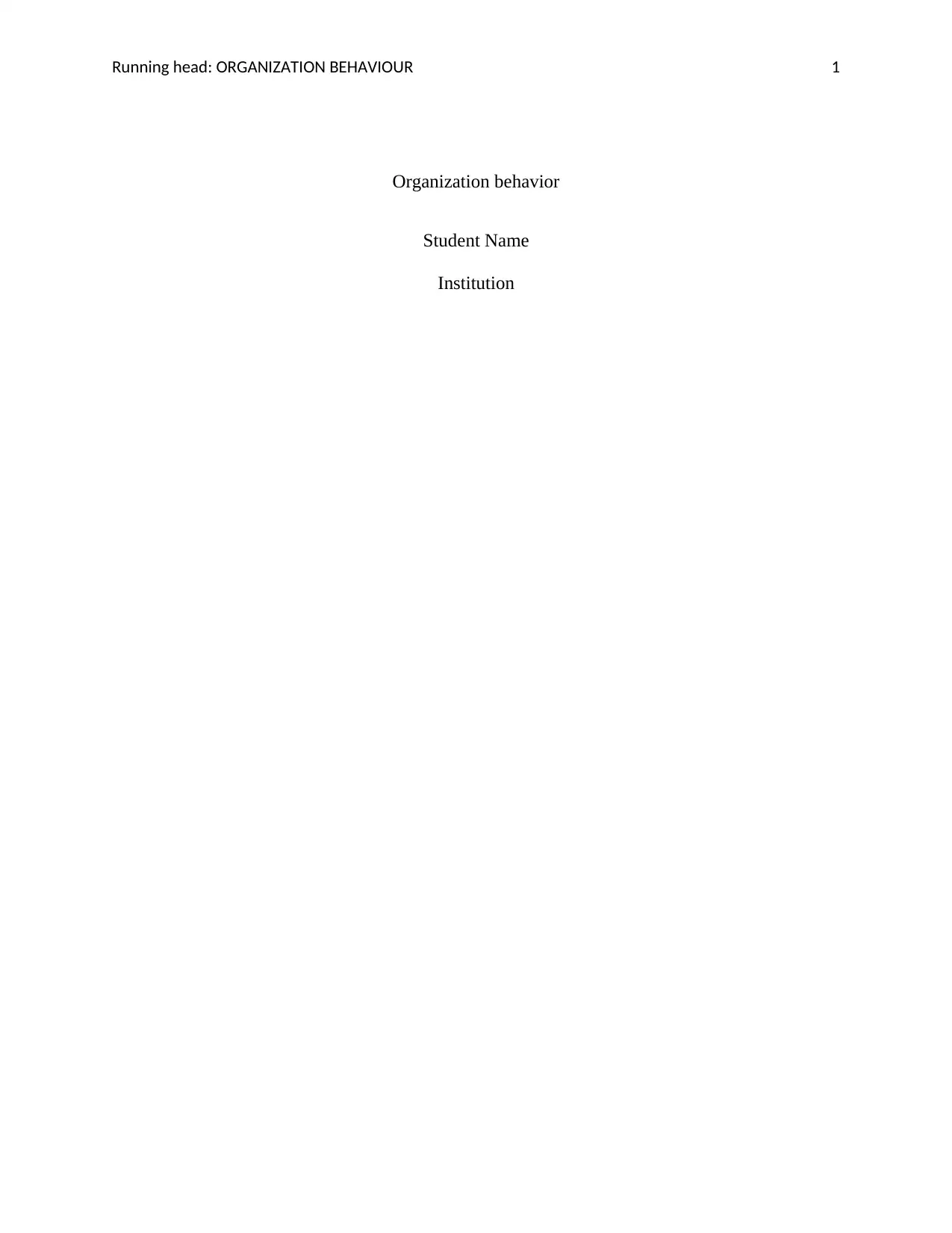
Running head: ORGANIZATION BEHAVIOUR 1
Organization behavior
Student Name
Institution
Organization behavior
Student Name
Institution
Paraphrase This Document
Need a fresh take? Get an instant paraphrase of this document with our AI Paraphraser
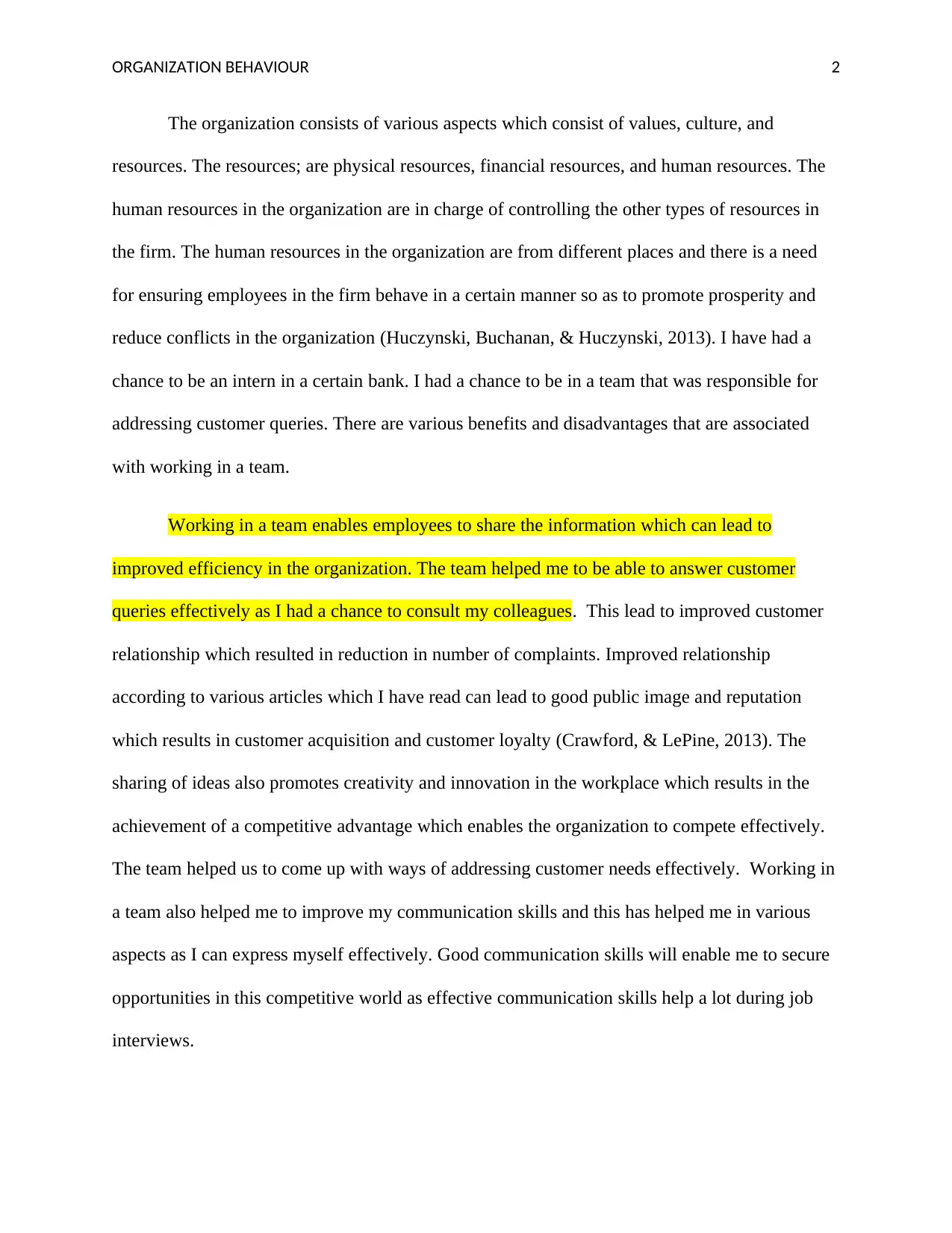
ORGANIZATION BEHAVIOUR 2
The organization consists of various aspects which consist of values, culture, and
resources. The resources; are physical resources, financial resources, and human resources. The
human resources in the organization are in charge of controlling the other types of resources in
the firm. The human resources in the organization are from different places and there is a need
for ensuring employees in the firm behave in a certain manner so as to promote prosperity and
reduce conflicts in the organization (Huczynski, Buchanan, & Huczynski, 2013). I have had a
chance to be an intern in a certain bank. I had a chance to be in a team that was responsible for
addressing customer queries. There are various benefits and disadvantages that are associated
with working in a team.
Working in a team enables employees to share the information which can lead to
improved efficiency in the organization. The team helped me to be able to answer customer
queries effectively as I had a chance to consult my colleagues. This lead to improved customer
relationship which resulted in reduction in number of complaints. Improved relationship
according to various articles which I have read can lead to good public image and reputation
which results in customer acquisition and customer loyalty (Crawford, & LePine, 2013). The
sharing of ideas also promotes creativity and innovation in the workplace which results in the
achievement of a competitive advantage which enables the organization to compete effectively.
The team helped us to come up with ways of addressing customer needs effectively. Working in
a team also helped me to improve my communication skills and this has helped me in various
aspects as I can express myself effectively. Good communication skills will enable me to secure
opportunities in this competitive world as effective communication skills help a lot during job
interviews.
The organization consists of various aspects which consist of values, culture, and
resources. The resources; are physical resources, financial resources, and human resources. The
human resources in the organization are in charge of controlling the other types of resources in
the firm. The human resources in the organization are from different places and there is a need
for ensuring employees in the firm behave in a certain manner so as to promote prosperity and
reduce conflicts in the organization (Huczynski, Buchanan, & Huczynski, 2013). I have had a
chance to be an intern in a certain bank. I had a chance to be in a team that was responsible for
addressing customer queries. There are various benefits and disadvantages that are associated
with working in a team.
Working in a team enables employees to share the information which can lead to
improved efficiency in the organization. The team helped me to be able to answer customer
queries effectively as I had a chance to consult my colleagues. This lead to improved customer
relationship which resulted in reduction in number of complaints. Improved relationship
according to various articles which I have read can lead to good public image and reputation
which results in customer acquisition and customer loyalty (Crawford, & LePine, 2013). The
sharing of ideas also promotes creativity and innovation in the workplace which results in the
achievement of a competitive advantage which enables the organization to compete effectively.
The team helped us to come up with ways of addressing customer needs effectively. Working in
a team also helped me to improve my communication skills and this has helped me in various
aspects as I can express myself effectively. Good communication skills will enable me to secure
opportunities in this competitive world as effective communication skills help a lot during job
interviews.
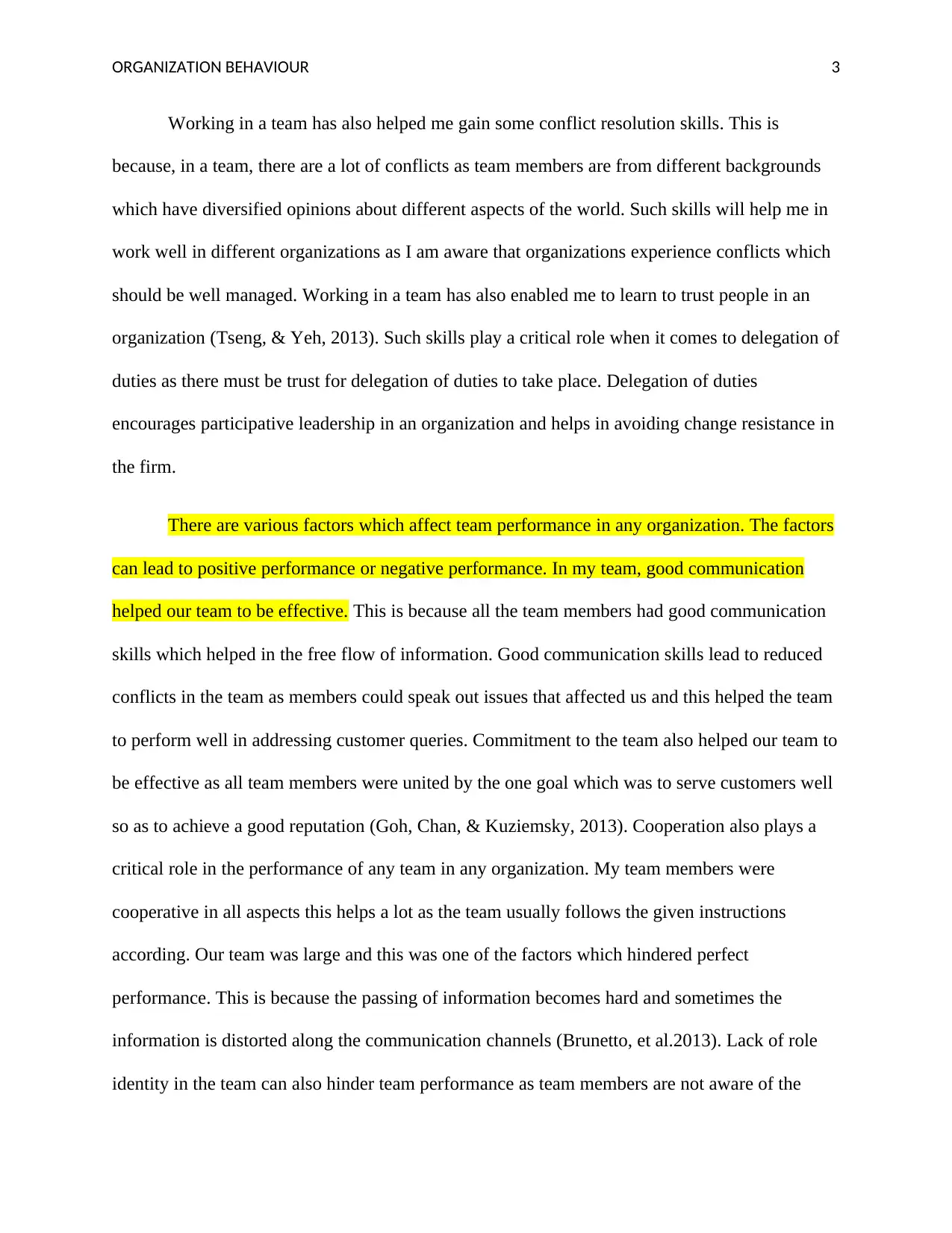
ORGANIZATION BEHAVIOUR 3
Working in a team has also helped me gain some conflict resolution skills. This is
because, in a team, there are a lot of conflicts as team members are from different backgrounds
which have diversified opinions about different aspects of the world. Such skills will help me in
work well in different organizations as I am aware that organizations experience conflicts which
should be well managed. Working in a team has also enabled me to learn to trust people in an
organization (Tseng, & Yeh, 2013). Such skills play a critical role when it comes to delegation of
duties as there must be trust for delegation of duties to take place. Delegation of duties
encourages participative leadership in an organization and helps in avoiding change resistance in
the firm.
There are various factors which affect team performance in any organization. The factors
can lead to positive performance or negative performance. In my team, good communication
helped our team to be effective. This is because all the team members had good communication
skills which helped in the free flow of information. Good communication skills lead to reduced
conflicts in the team as members could speak out issues that affected us and this helped the team
to perform well in addressing customer queries. Commitment to the team also helped our team to
be effective as all team members were united by the one goal which was to serve customers well
so as to achieve a good reputation (Goh, Chan, & Kuziemsky, 2013). Cooperation also plays a
critical role in the performance of any team in any organization. My team members were
cooperative in all aspects this helps a lot as the team usually follows the given instructions
according. Our team was large and this was one of the factors which hindered perfect
performance. This is because the passing of information becomes hard and sometimes the
information is distorted along the communication channels (Brunetto, et al.2013). Lack of role
identity in the team can also hinder team performance as team members are not aware of the
Working in a team has also helped me gain some conflict resolution skills. This is
because, in a team, there are a lot of conflicts as team members are from different backgrounds
which have diversified opinions about different aspects of the world. Such skills will help me in
work well in different organizations as I am aware that organizations experience conflicts which
should be well managed. Working in a team has also enabled me to learn to trust people in an
organization (Tseng, & Yeh, 2013). Such skills play a critical role when it comes to delegation of
duties as there must be trust for delegation of duties to take place. Delegation of duties
encourages participative leadership in an organization and helps in avoiding change resistance in
the firm.
There are various factors which affect team performance in any organization. The factors
can lead to positive performance or negative performance. In my team, good communication
helped our team to be effective. This is because all the team members had good communication
skills which helped in the free flow of information. Good communication skills lead to reduced
conflicts in the team as members could speak out issues that affected us and this helped the team
to perform well in addressing customer queries. Commitment to the team also helped our team to
be effective as all team members were united by the one goal which was to serve customers well
so as to achieve a good reputation (Goh, Chan, & Kuziemsky, 2013). Cooperation also plays a
critical role in the performance of any team in any organization. My team members were
cooperative in all aspects this helps a lot as the team usually follows the given instructions
according. Our team was large and this was one of the factors which hindered perfect
performance. This is because the passing of information becomes hard and sometimes the
information is distorted along the communication channels (Brunetto, et al.2013). Lack of role
identity in the team can also hinder team performance as team members are not aware of the
⊘ This is a preview!⊘
Do you want full access?
Subscribe today to unlock all pages.

Trusted by 1+ million students worldwide
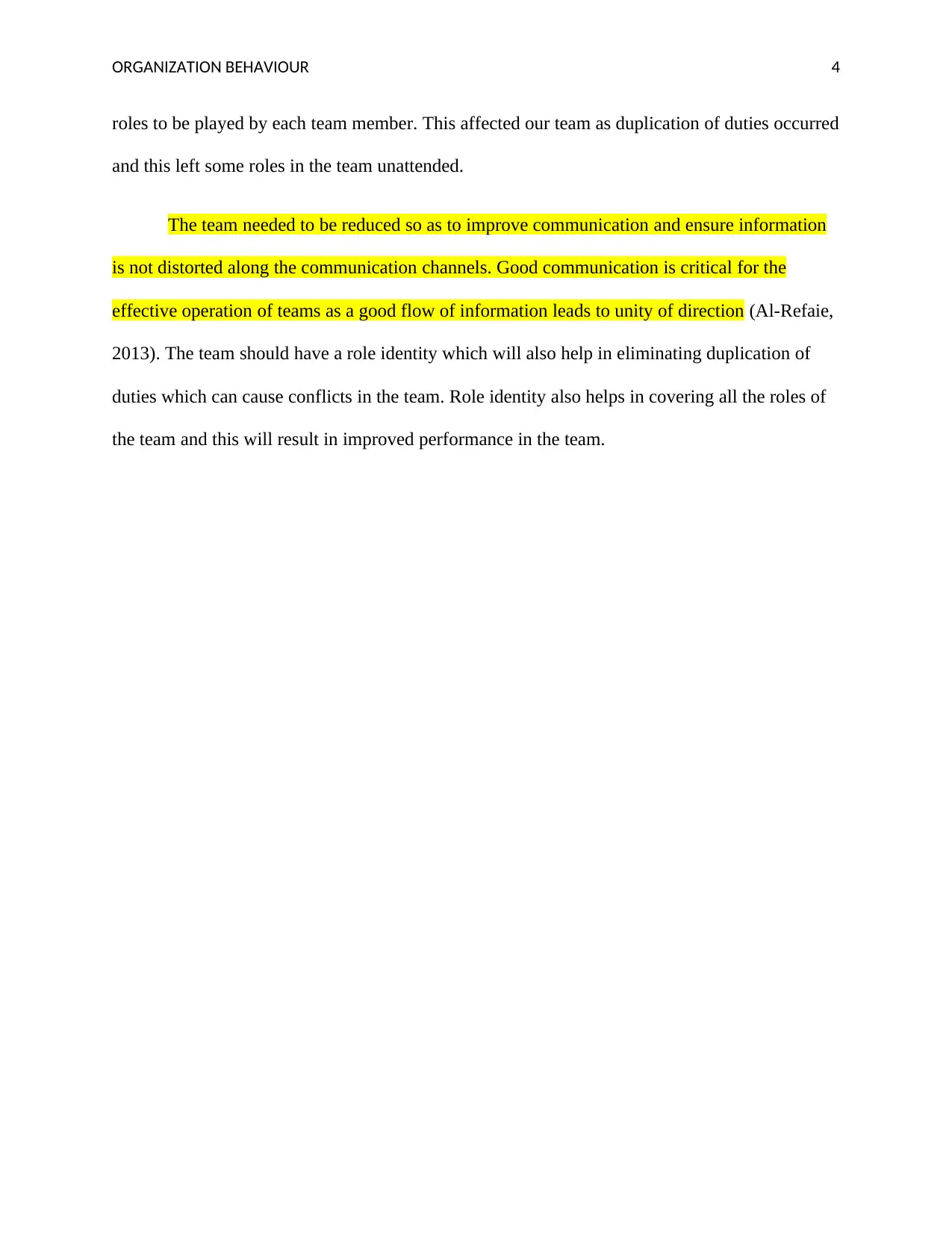
ORGANIZATION BEHAVIOUR 4
roles to be played by each team member. This affected our team as duplication of duties occurred
and this left some roles in the team unattended.
The team needed to be reduced so as to improve communication and ensure information
is not distorted along the communication channels. Good communication is critical for the
effective operation of teams as a good flow of information leads to unity of direction (Al-Refaie,
2013). The team should have a role identity which will also help in eliminating duplication of
duties which can cause conflicts in the team. Role identity also helps in covering all the roles of
the team and this will result in improved performance in the team.
roles to be played by each team member. This affected our team as duplication of duties occurred
and this left some roles in the team unattended.
The team needed to be reduced so as to improve communication and ensure information
is not distorted along the communication channels. Good communication is critical for the
effective operation of teams as a good flow of information leads to unity of direction (Al-Refaie,
2013). The team should have a role identity which will also help in eliminating duplication of
duties which can cause conflicts in the team. Role identity also helps in covering all the roles of
the team and this will result in improved performance in the team.
Paraphrase This Document
Need a fresh take? Get an instant paraphrase of this document with our AI Paraphraser
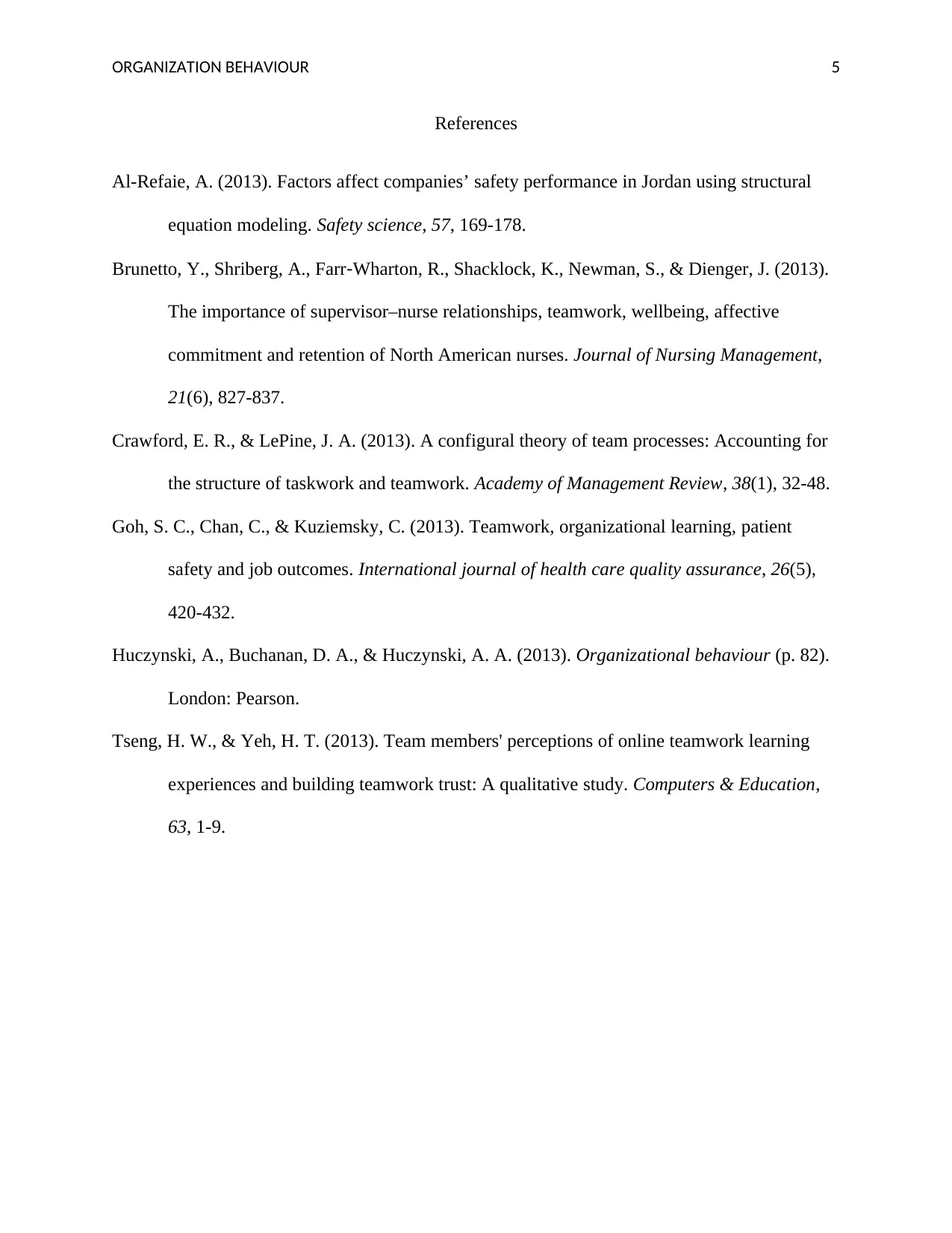
ORGANIZATION BEHAVIOUR 5
References
Al-Refaie, A. (2013). Factors affect companies’ safety performance in Jordan using structural
equation modeling. Safety science, 57, 169-178.
Brunetto, Y., Shriberg, A., Farr‐Wharton, R., Shacklock, K., Newman, S., & Dienger, J. (2013).
The importance of supervisor–nurse relationships, teamwork, wellbeing, affective
commitment and retention of North American nurses. Journal of Nursing Management,
21(6), 827-837.
Crawford, E. R., & LePine, J. A. (2013). A configural theory of team processes: Accounting for
the structure of taskwork and teamwork. Academy of Management Review, 38(1), 32-48.
Goh, S. C., Chan, C., & Kuziemsky, C. (2013). Teamwork, organizational learning, patient
safety and job outcomes. International journal of health care quality assurance, 26(5),
420-432.
Huczynski, A., Buchanan, D. A., & Huczynski, A. A. (2013). Organizational behaviour (p. 82).
London: Pearson.
Tseng, H. W., & Yeh, H. T. (2013). Team members' perceptions of online teamwork learning
experiences and building teamwork trust: A qualitative study. Computers & Education,
63, 1-9.
References
Al-Refaie, A. (2013). Factors affect companies’ safety performance in Jordan using structural
equation modeling. Safety science, 57, 169-178.
Brunetto, Y., Shriberg, A., Farr‐Wharton, R., Shacklock, K., Newman, S., & Dienger, J. (2013).
The importance of supervisor–nurse relationships, teamwork, wellbeing, affective
commitment and retention of North American nurses. Journal of Nursing Management,
21(6), 827-837.
Crawford, E. R., & LePine, J. A. (2013). A configural theory of team processes: Accounting for
the structure of taskwork and teamwork. Academy of Management Review, 38(1), 32-48.
Goh, S. C., Chan, C., & Kuziemsky, C. (2013). Teamwork, organizational learning, patient
safety and job outcomes. International journal of health care quality assurance, 26(5),
420-432.
Huczynski, A., Buchanan, D. A., & Huczynski, A. A. (2013). Organizational behaviour (p. 82).
London: Pearson.
Tseng, H. W., & Yeh, H. T. (2013). Team members' perceptions of online teamwork learning
experiences and building teamwork trust: A qualitative study. Computers & Education,
63, 1-9.
1 out of 5
Related Documents
Your All-in-One AI-Powered Toolkit for Academic Success.
+13062052269
info@desklib.com
Available 24*7 on WhatsApp / Email
![[object Object]](/_next/static/media/star-bottom.7253800d.svg)
Unlock your academic potential
Copyright © 2020–2026 A2Z Services. All Rights Reserved. Developed and managed by ZUCOL.





